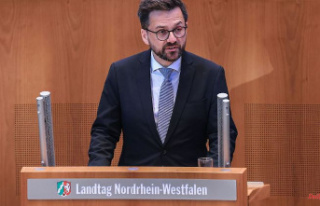Kempen (dpa / lnw) - After many years of complaints from commuters on the Lower Rhine, Deutsche Bahn presented a comprehensive modernization of the RE 10 train line (Düsseldorf-Kleve), the so-called Niers-Express, on Tuesday. "The future is between Kleve and Kempen," was the motto at an event in Kempen near Krefeld. The line connects the Lower Rhine with Düsseldorf and is used by around 20,000 people every day, including many commuters.
The state of the route was "miserable" before the modernization, said the national chairman of the passenger association Pro Bahn, Detlef Neuss, who comes from nearby Mönchengladbach. Trains often had to drive very slowly, especially at level crossings. It will definitely get better now.
On 54 kilometers between Kempen and Kleve, 76 level crossings have been renewed and twelve signal boxes have been digitized, Deutsche Bahn said on Tuesday. This enables more flexible control and ensures greater reliability of the rail network. The expansion is part of a nationwide 500 million federal modernization program for the railways, which is also intended to promote climate protection.
Some rail users have criticized the initial problems on the line, which has been back in operation since the end of November after the renovation. The Traffic Club Germany (VCD) NRW complains that signal box failures and disruptions to level crossings have already thrown the traffic "properly out of step" in the first few weeks after the 70 million euro modernization on the Lower Rhine. The start of operations failed.
Neuss said that at the start there were "teething troubles without end". The railway and the operator of the line, the Rhein-Ruhr-Bahn, should have tested the technology better before commissioning.












